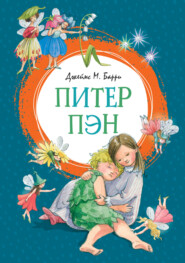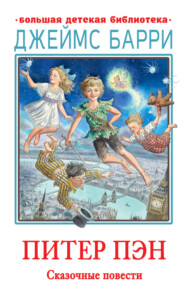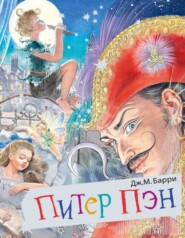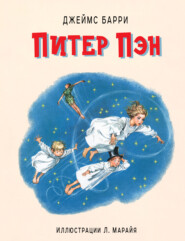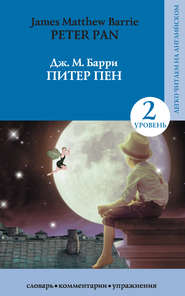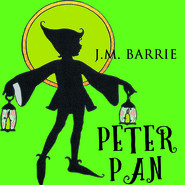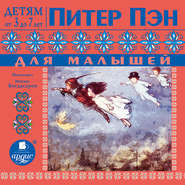По всем вопросам обращайтесь на: info@litportal.ru
(©) 2003-2024.
✖
Peter Pan
Автор
Год написания книги
2017
Настройки чтения
Размер шрифта
Высота строк
Поля
This dread made her forgetful of what must be Peter’s feelings, and she said to him rather sharply, “Peter, will you make the necessary arrangements?”
“If you wish it,” he replied, as coolly as if she had asked him to pass the nuts.
Not so much as a sorry-to-lose-you between them! If she did not mind the parting, he was going to show her, was Peter, that neither did he.
But of course he cared very much; and he was so full of wrath against grown-ups, who, as usual, were spoiling everything, that as soon as he got inside his tree he breathed intentionally quick short breaths at the rate of about five to a second. He did this because there is a saying in the Neverland that, every time you breathe, a grown-up dies; and Peter was killing them off vindictively as fast as possible.
Then having given the necessary instructions to the redskins he returned to the home, where an unworthy scene had been enacted in his absence. Panic-stricken at the thought of losing Wendy the lost boys had advanced upon her threateningly.
“It will be worse than before she came,” they cried.
“We shan’t let her go.”
“Let’s keep her prisoner.”
“Ay, chain her up.”
In her extremity an instinct told her to which of them to turn.
“Tootles,” she cried, “I appeal to you.”
Was it not strange? She appealed to Tootles, quite the silliest one.
Grandly, however, did Tootles respond. For that one moment he dropped his silliness and spoke with dignity.
“I am just Tootles,” he said, “and nobody minds me. But the first who does not behave to Wendy like an English gentleman I will blood him severely.”
He drew back his hanger; and for that instant his sun was at noon. The others held back uneasily. Then Peter returned, and they saw at once that they would get no support from him. He would keep no girl in the Neverland against her will.
“Wendy,” he said, striding up and down, “I have asked the redskins to guide you through the wood, as flying tires you so.”
“Thank you, Peter.”
“Then,” he continued, in the short sharp voice of one accustomed to be obeyed, “Tinker Bell will take you across the sea. Wake her, Nibs.”
Nibs had to knock twice before he got an answer, though Tink had really been sitting up in bed listening for some time.
“Who are you? How dare you? Go away,” she cried.
“You are to get up, Tink,” Nibs called, “and take Wendy on a journey.”
Of course Tink had been delighted to hear that Wendy was going; but she was jolly well determined not to be her courier, and she said so in still more offensive language. Then she pretended to be asleep again.
“She says she won’t!” Nibs exclaimed, aghast at such insubordination, whereupon Peter went sternly toward the young lady’s chamber.
“Tink,” he rapped out, “if you don’t get up and dress at once I will open the curtains, and then we shall all see you in your negligee [nightgown].”
This made her leap to the floor. “Who said I wasn’t getting up?” she cried.
In the meantime the boys were gazing very forlornly at Wendy, now equipped with John and Michael for the journey. By this time they were dejected, not merely because they were about to lose her, but also because they felt that she was going off to something nice to which they had not been invited. Novelty was beckoning to them as usual.
Crediting them with a nobler feeling Wendy melted.
“Dear ones,” she said, “if you will all come with me I feel almost sure I can get my father and mother to adopt you.”
The invitation was meant specially for Peter, but each of the boys was thinking exclusively of himself, and at once they jumped with joy.
“But won’t they think us rather a handful?” Nibs asked in the middle of his jump.
“Oh no,” said Wendy, rapidly thinking it out, “it will only mean having a few beds in the drawing-room; they can be hidden behind the screens on first Thursdays.”
“Peter, can we go?” they all cried imploringly. They took it for granted that if they went he would go also, but really they scarcely cared. Thus children are ever ready, when novelty knocks, to desert their dearest ones.
“All right,” Peter replied with a bitter smile, and immediately they rushed to get their things.
“And now, Peter,” Wendy said, thinking she had put everything right, “I am going to give you your medicine before you go.” She loved to give them medicine, and undoubtedly gave them too much. Of course it was only water, but it was out of a bottle, and she always shook the bottle and counted the drops, which gave it a certain medicinal quality. On this occasion, however, she did not give Peter his draught [portion], for just as she had prepared it, she saw a look on his face that made her heart sink.
“Get your things, Peter,” she cried, shaking.
“No,” he answered, pretending indifference, “I am not going with you, Wendy.”
“Yes, Peter.”
“No.”
To show that her departure would leave him unmoved, he skipped up and down the room, playing gaily on his heartless pipes. She had to run about after him, though it was rather undignified.
“To find your mother,” she coaxed.
Now, if Peter had ever quite had a mother, he no longer missed her. He could do very well without one. He had thought them out, and remembered only their bad points.
“No, no,” he told Wendy decisively; “perhaps she would say I was old, and I just want always to be a little boy and to have fun.”
“But, Peter – ”
“No.”
And so the others had to be told.
“Peter isn’t coming.”
Peter not coming! They gazed blankly at him, their sticks over their backs, and on each stick a bundle. Their first thought was that if Peter was not going he had probably changed his mind about letting them go.
But he was far too proud for that. “If you find your mothers,” he said darkly, “I hope you will like them.”
The awful cynicism of this made an uncomfortable impression, and most of them began to look rather doubtful. After all, their faces said, were they not noodles to want to go?
“Now then,” cried Peter, “no fuss, no blubbering; good-bye, Wendy;” and he held out his hand cheerily, quite as if they must really go now, for he had something important to do.
“If you wish it,” he replied, as coolly as if she had asked him to pass the nuts.
Not so much as a sorry-to-lose-you between them! If she did not mind the parting, he was going to show her, was Peter, that neither did he.
But of course he cared very much; and he was so full of wrath against grown-ups, who, as usual, were spoiling everything, that as soon as he got inside his tree he breathed intentionally quick short breaths at the rate of about five to a second. He did this because there is a saying in the Neverland that, every time you breathe, a grown-up dies; and Peter was killing them off vindictively as fast as possible.
Then having given the necessary instructions to the redskins he returned to the home, where an unworthy scene had been enacted in his absence. Panic-stricken at the thought of losing Wendy the lost boys had advanced upon her threateningly.
“It will be worse than before she came,” they cried.
“We shan’t let her go.”
“Let’s keep her prisoner.”
“Ay, chain her up.”
In her extremity an instinct told her to which of them to turn.
“Tootles,” she cried, “I appeal to you.”
Was it not strange? She appealed to Tootles, quite the silliest one.
Grandly, however, did Tootles respond. For that one moment he dropped his silliness and spoke with dignity.
“I am just Tootles,” he said, “and nobody minds me. But the first who does not behave to Wendy like an English gentleman I will blood him severely.”
He drew back his hanger; and for that instant his sun was at noon. The others held back uneasily. Then Peter returned, and they saw at once that they would get no support from him. He would keep no girl in the Neverland against her will.
“Wendy,” he said, striding up and down, “I have asked the redskins to guide you through the wood, as flying tires you so.”
“Thank you, Peter.”
“Then,” he continued, in the short sharp voice of one accustomed to be obeyed, “Tinker Bell will take you across the sea. Wake her, Nibs.”
Nibs had to knock twice before he got an answer, though Tink had really been sitting up in bed listening for some time.
“Who are you? How dare you? Go away,” she cried.
“You are to get up, Tink,” Nibs called, “and take Wendy on a journey.”
Of course Tink had been delighted to hear that Wendy was going; but she was jolly well determined not to be her courier, and she said so in still more offensive language. Then she pretended to be asleep again.
“She says she won’t!” Nibs exclaimed, aghast at such insubordination, whereupon Peter went sternly toward the young lady’s chamber.
“Tink,” he rapped out, “if you don’t get up and dress at once I will open the curtains, and then we shall all see you in your negligee [nightgown].”
This made her leap to the floor. “Who said I wasn’t getting up?” she cried.
In the meantime the boys were gazing very forlornly at Wendy, now equipped with John and Michael for the journey. By this time they were dejected, not merely because they were about to lose her, but also because they felt that she was going off to something nice to which they had not been invited. Novelty was beckoning to them as usual.
Crediting them with a nobler feeling Wendy melted.
“Dear ones,” she said, “if you will all come with me I feel almost sure I can get my father and mother to adopt you.”
The invitation was meant specially for Peter, but each of the boys was thinking exclusively of himself, and at once they jumped with joy.
“But won’t they think us rather a handful?” Nibs asked in the middle of his jump.
“Oh no,” said Wendy, rapidly thinking it out, “it will only mean having a few beds in the drawing-room; they can be hidden behind the screens on first Thursdays.”
“Peter, can we go?” they all cried imploringly. They took it for granted that if they went he would go also, but really they scarcely cared. Thus children are ever ready, when novelty knocks, to desert their dearest ones.
“All right,” Peter replied with a bitter smile, and immediately they rushed to get their things.
“And now, Peter,” Wendy said, thinking she had put everything right, “I am going to give you your medicine before you go.” She loved to give them medicine, and undoubtedly gave them too much. Of course it was only water, but it was out of a bottle, and she always shook the bottle and counted the drops, which gave it a certain medicinal quality. On this occasion, however, she did not give Peter his draught [portion], for just as she had prepared it, she saw a look on his face that made her heart sink.
“Get your things, Peter,” she cried, shaking.
“No,” he answered, pretending indifference, “I am not going with you, Wendy.”
“Yes, Peter.”
“No.”
To show that her departure would leave him unmoved, he skipped up and down the room, playing gaily on his heartless pipes. She had to run about after him, though it was rather undignified.
“To find your mother,” she coaxed.
Now, if Peter had ever quite had a mother, he no longer missed her. He could do very well without one. He had thought them out, and remembered only their bad points.
“No, no,” he told Wendy decisively; “perhaps she would say I was old, and I just want always to be a little boy and to have fun.”
“But, Peter – ”
“No.”
And so the others had to be told.
“Peter isn’t coming.”
Peter not coming! They gazed blankly at him, their sticks over their backs, and on each stick a bundle. Their first thought was that if Peter was not going he had probably changed his mind about letting them go.
But he was far too proud for that. “If you find your mothers,” he said darkly, “I hope you will like them.”
The awful cynicism of this made an uncomfortable impression, and most of them began to look rather doubtful. After all, their faces said, were they not noodles to want to go?
“Now then,” cried Peter, “no fuss, no blubbering; good-bye, Wendy;” and he held out his hand cheerily, quite as if they must really go now, for he had something important to do.






